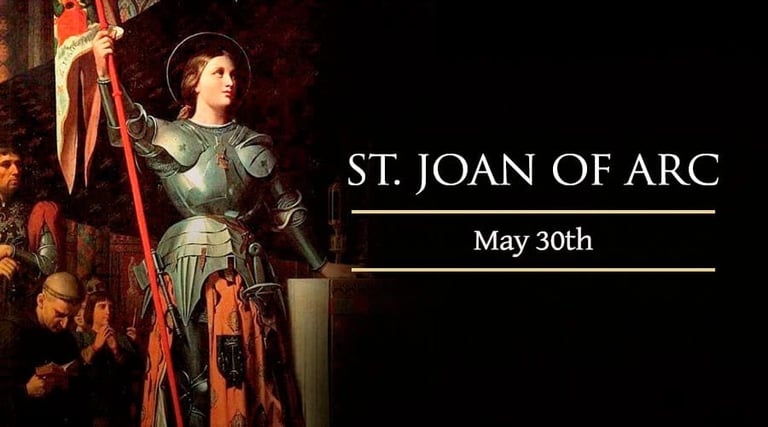Saint of the day May 30, 2025
St. Joan of Arc
DAILY SAINT
Nirmala Josephine
5/30/20252 min read


Today is the feast of St. Joan of Arc, the patroness of France. Joan was born to a peasant family in Champagne, France in the early 15th century.
From a young age she heard the voices of St. Michael, St. Catherine, and St. Margaret speaking to her. Then, in 1428, when she was 13 years old, she received a vision telling her to go to the King of France and help him reconquer his kingdom from the invading forces of England and Burgundy.
Overcoming opposition and convincing members of the court and of the Church, she was given a small army. She charged into battle bearing a banner which bore the names “Jesus” and “Mary” as well as a symbol of the Holy Spirit.
Due to her leadership and trust in God, she was able to raise the siege of Orleans in 1429. Joan and her army went on to win a series of battles. Because of her efforts, the king was able to enter Rheims. He was crowned with Joan at his side.
Eventually, Joan was captured by the forces of Burgundy in May of 1430. When her own king and army did nothing to save her, she was sold to the English. She was imprisoned for a time and then put on trial. Bishop Peter Cauchon of Beauvais presided over her trial. His hope was that in being harsh with Joan, the English would help him become archbishop.
Joan was condemned to death on counts of heresy, witchcraft, and adultery. On May 30, 1431, she was burned at the stake in Rouen, France. She was 19 years old.
Thirty years after her death, her case was retried and she was exonerated. In 1920, she was canonized by Pope Benedict XV. She is the patroness of France, captives, soldiers, and those ridiculed for their piety, besides for
those in need of courage, those ridiculed for their faith, and youth, among other things.
Reflection
Joan of Arc was not canonized for her ability to free the French from English dominance, but for her heroic dedication to the will of God and personal holiness. While Joan commanded the army of France, she drove prostitutes from camp, refused to allow soldiers to rape and pillage the towns that gave them entrance, encouraged confession before battle, and sharply reduced the cussing and oath-swearing of the men under her charge.
She remained committed to a life of contemplation and prayer amid the battles she oversaw, never once lifting her sword against anyone save to chase out a prostitute. Her faith and insights became evident at her trial, forming the foundation of several summaries of theology in the Catechism of the Catholic Church, and her confidence in Jesus and the Catholic Church remained unshaken, even after being wrongly condemned to death by the Church.
“Joan of Arc is like a shooting star across the landscape of French and English history, amid the stories of the Church’s saints and into our consciousness. Women identify with her; men admire her courage. She challenges us in fundamental ways. Despite the fact that more than 500 years have passed since she lived, her issues of mysticism, calling, identity, trust and betrayal, conflict and focus are our issues still.”
